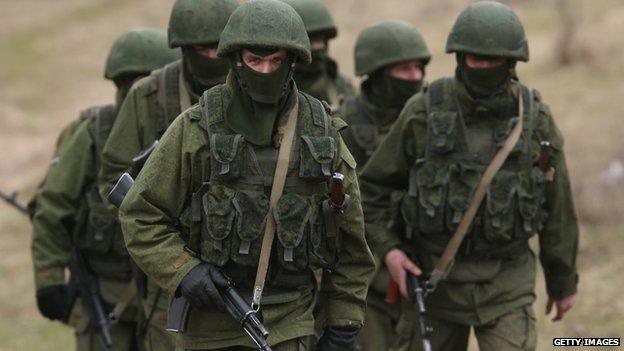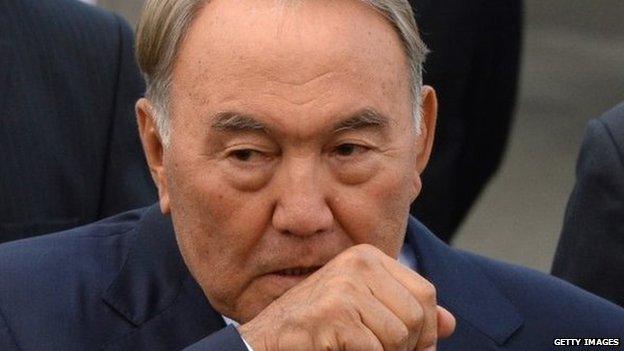Could a 'Ukrainian scenario' play out in Kazakhstan?
- Published

The actions of pro-Russian troops in Crimea has worried Kazakhs
Kazakhstan is one of Russia's main allies. It is Moscow's strategic partner and the two countries regularly hold joint military exercises. They have close trade links as both are trying to develop a common market.
Russia and Kazakhstan actively collaborate in a number of fields, from space to energy. Their relationship has been like the one between the UK and US.
But Russia's military action in Crimea has created unease among Kazakhs. They are worried that a "Ukrainian scenario" could also apply to this Central Asian nation.
Like Ukraine, Kazakhstan has a large ethnic Russian community.
In the northern Kostanay region, Russians make up half the population, according to the 2009 census. In other regions, notably in the east, there are fewer ethnic Kazakhs than ethnic Russians.
Galym Ageleuov, a human rights activist, claims that given this ethnic composition, the approach used in Ukraine can be applied in Kazakhstan too.
"Russia can also put pressure on Kazakhstan using a pretext of defending ethnic Russians, even though there is no discrimination or oppression of ethnic Russians of a serious scale here," he says.
Kazakhstan adopts a cautious position when discussing events in Ukraine in public.
President Nursultan Nazarbayev told his Russian counterpart Vladimir Putin in a phone conversation that he "understands Russia's stance on protection of the rights of national minorities in Ukraine and its security interests".

Nursultan Nazarbayev expressed veiled criticism of Moscow's show of force
But he also called for a peaceful resolution "on the basis of preservation of Ukraine's sovereignty within the norms of international law".
Such rather neutral statements, according to political analyst Sergey Duvanov, highlight Kazakhstan's ambivalence about Russia's military action.
"Kazakhstan didn't openly support Russia's activities in Ukraine," Mr Duvanov said. "Nazarbayev's statements show he wants to keep neutrality.
"But we should keep in mind that Kazakhstan is Russia's closest partner, and in this situation such neutrality is not in favour of Moscow. It's in favour of Kiev."
Combat-ready
In conversations with German Chancellor Angela Merkel and US President Barack Obama, Mr Nazarbayev also spoke of a peaceful settlement, "which would ensure the territorial integrity" of Ukraine. In other words, Kazakhstan is against annexing Crimea.
Territorial integrity is an important issue for Kazakhstan. Its northern territories also have historical connections to Russia as cities such as Ust Kamenogorsk, Pavlodar, Uralsk and others were founded by Russians as military outposts and were part of Tsarist Russia.
When Ukrainian leaders appeal to the West to protect it from Russian aggression, they refer to the Budapest memorandum signed in 1994, which stated that the US, UK and Russia would guarantee Ukraine's security and territorial integrity if it gave up its nuclear arsenal.
Kazakhstan signed a similar agreement on nuclear disarmament in exchange for protection in the same year.
And now Astana fears that if the Budapest memorandum is violated then "no-one can really trust those guarantees from nuclear states any more", says Nargis Kassenova, director of the Central Asian Studies Center in Almaty.
Thus last week, possibly as a reaction to the Ukrainian crisis, President Nazarbayev gathered all his top military officials for a "strategic council" where he urged that "intensive combat preparations" be maintained.